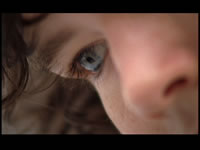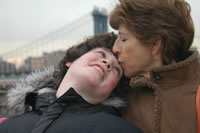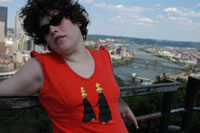Rachael is (2014)
Cast includes: Rachael Glynn, Charlotte Glynn, Jane Bernstein
Director: Charlotte Glynn
Genre: Documentary (67 minutes)
“An accident in development…” they didn’t really know. All they knew was that “when she was a few months old, she didn’t track things with her eyes… eventually she was diagnosed as intellectually impaired.” Rachael’s sister Charlotte has decided to make a film about Rachael. “Rachael, what happened in 1991?” Charlotte asks. Rachael doesn’t know. “We moved to Pittsburgh in 1991.” “In what way?” asks Rachael. Charlotte’s not sure how to answer that. “Physically,” she finally says. “This is my sister, Rachael… When we were young, I never thought of her as being human. There’s no give and take with Rachael. There’s no bond.” Rachael is 21 now, and she’s going to be graduating from her special school in 6 months. This is a critical time because Rachael is waiting for a placement in a group home. Hundreds of thousands are waiting.
“I wanna be someplace else where I don’t have to see you again,” Rachael screams at her mom. Next she says, “I wanna be here with you, Mom.” Rachael is a puzzle. You might say her abilities are similar to that of a 6-year-old, but with a lot of frustration and aggression layered on. But that would be an oversimplification. Jane, Rachael’s mom, points out that being with Rachael for a few hours or even a few weeks is totally different from being with Rachael everyday. Now that Rachael is graduating from school, she needs a situation that will work long term. As with other developmentally challenged adults, living at home with a parent isn’t the solution. Rachael’s attitude toward Jane can best be described as “hostile dependence.” Jane tells us, “You might think I want her out of the house because I’m sick of her. I am sick of her. But I love her.” With the lack of group homes, another option is for Rachael to go live with another family. In that way, Rachael can break the cycle of hostile dependence. Jane has reservations, but she’s trying to keep an open mind.
Rachael is is a non-judgmental view of life with a developmentally challenged child. Unlike other films on similar subjects, it’s neither depressing nor optimistic. It’s very realistic. Charlotte readily admits she’s never felt a bond with Rachael, and Jane tells us she’s looking forward to not having Rachael there all the time. Yet they do love her. There’s a reason Jane is working so hard to get Rachael into a group home instead of a “life-sharing” situation with another family. "Life sharing doesn’t offer what Rachael needs… a chance to make friends and develop a social life." The film sheds light on the shortage of group homes and why that’s so problematic. Also, the complexities are nicely rendered… by the end, we feel as if we understand significantly more than we did at the beginning. The film is well worth watching (available on demand). When Jane is asked if she’ll be sad to see Rachael move away, she doesn’t know how to respond. “It’s a different emotion… one that doesn’t have a name.” At this point, we’re actually starting to understand.

3 popped kernels
It’s always hard to see your child leave the nest, but when she’s developmentally challenged there aren’t many good options
Popcorn Profile
Audience: Grown-ups
Gender Style: Sensitive
Distribution: Direct to Video
Mood: Sober
Tempo: In No Hurry
Visual Style: Unvarnished Realism
Nutshell: Life with a developmentally challenged child
Language: True to life
Social Significance: Informative & Thought Provoking



